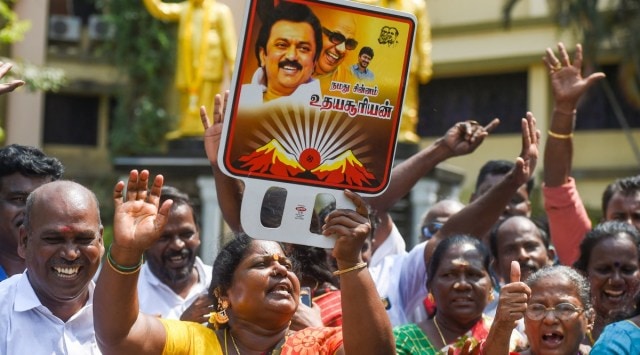TN urban body polls: DMK, AIADMK continue to hold sway over 68% of voters; BJP, Cong brag over third position
While the BJP that contested alone in 5,594 seats won 308 seats (5.41% vote share), the Congress, part of the DMK alliance, contested 1,370 seats and won 592 seats (3.31% vote share)
 The DMK secured a vote share of 43.13% against the principal opposition AIADMK’s 25.15% (PTI, file)
The DMK secured a vote share of 43.13% against the principal opposition AIADMK’s 25.15% (PTI, file)The final vote-share of parties in the results to the TN urban local body polls released by the state election commission on Thursday showed the ruling DMK, which tasted a landslide victory, securing a vote share of 43.13% against the principal opposition AIADMK’s 25.15%.
Even as the AIADMK was at a distant second position in the number of seats they won and was seen as a sinking ship with a major split and mutinies in recent years, it is to be noted that the overall vote share stick to the traditional pattern in the state — the two Dravidian majors occupy 68% of the total votes.
If the two powerful Dravidian parties have seemingly retained their minimum cadre, the 13.01% vote share claimed by independent candidates asserts this fact yet again as a good number of independent candidates in urban localities were either DMK or AIADMK who chose to contest on their own due to quarrels or denial of tickets within the party. And these turbulences during the local body polls usually are harmless as all of them usually return to their own parties during the Assembly, Lok Sabha polls.
The two national parties, BJP and Congress, too have significant stakes as per the official poll data released; BJP that contested alone in 5,594 seats, and won 308 seats has secured a vote share of 5.41%. The Congress, part of the DMK alliance, contested 1,370 seats. won 592 seats, has a vote share of 3.31%.
However, the dispute remains between the two national parties on who is the third-largest party – one with more vote share or number of seats.
A comparison between Congress and BJP may be tricky; Congress contested as part of a powerful alliance, fought on fewer seats, secured more number of seats but with a lesser vote share whereas BJP contested alone in more seats, won lesser seats but with a better vote share. Congress, which was always in the DMK alliance, had a vote share of 4.3% when they contested alone in the 2014 Lok Sabha polls, amid a strong anti-incumbency wave against the then UPA government. And BJP also had a minimal increase this time – of about 82 seats -compared to their performance in the 2011 local body polls. However they were not in power in Delhi then, nor had a friendly backing from AIADMK too.
But it may be concluded that the poll results yet again reaffirms the need for a powerful DMK or AIADMK for smaller parties to win seats.
And if it is all about vote share, parties have to field candidates in maximum number of seats. But the future of parties who followed this path was grim.
In 2006 assembly polls, Captain Vijayakanth’s DMDK contested alone from all seats and secured a vote share of 8.33% and one seat. Five years later, in the AIADMK alliance, party’s vote share increased to 11% and half a dozen MLAs. But hardly a decade later, DMDK is now pushed behind 10th position, behind even Kamal Haasan’s smaller outfit, MNM. One of the main reasons may be that it wasn’t part of a winning alliance after 2011.
Seeman’s Naam Tamilar Katchi (NTK) has always been a lone fighter and survivor. The party, mostly flaunting Tamil nationalism, the pride in local culture, traditions and projecting DMK and AIADMK as enemies, has always fought alone in polls. Yet, despite facing several elections alone, it had managed to secure a vote share of 6.58% in the last Assembly polls. It emerged as the third-largest party though not a single candidate in 234 Assembly seats won. But the vote share of NTK in the recent urban polls dropped to 1.35%, a setback that deserves serious attention.







